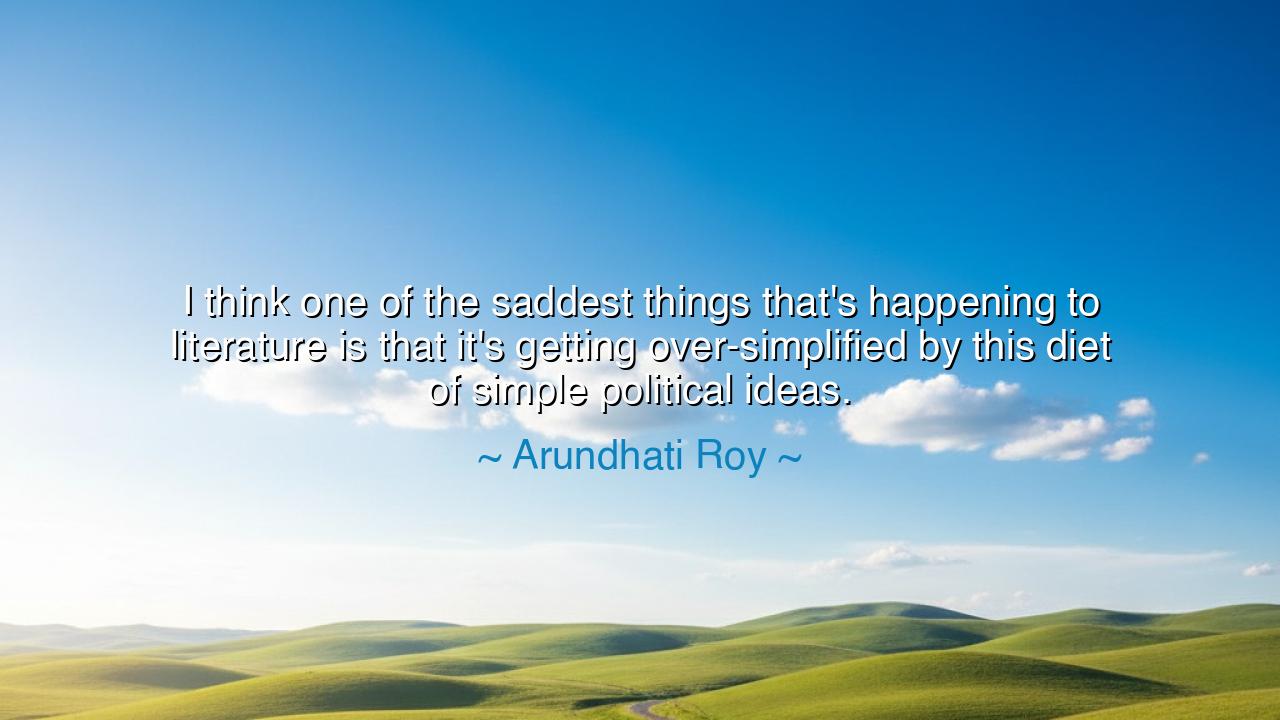
I think one of the saddest things that's happening to literature
I think one of the saddest things that's happening to literature is that it's getting over-simplified by this diet of simple political ideas.






When Arundhati Roy said, “I think one of the saddest things that's happening to literature is that it's getting over-simplified by this diet of simple political ideas,” she was not merely speaking as a novelist, but as a guardian of truth, lamenting the slow decay of the written word’s sacred purpose. Her words are both a mourning and a warning — that the soul of literature, once vast and alive with contradiction, is being starved by reduction, by ideology, by the fast food of thought. She reminds us that true art, like true life, must contain complexity, ambiguity, and rebellion. To reduce it to slogans and sides is to betray its divine function: to reveal, not to recruit.
The origin of her insight lies in the age we now inhabit — an age that prizes speed over depth, and certainty over wonder. In the marketplace of attention, literature too has become a commodity, its richness stripped for the sake of clarity and political digestibility. Roy sees this as a spiritual famine: a diet of ideas that feeds the ego but starves the imagination. What was once a feast of nuance — the poetry of paradox, the dialogue between good and evil within the same heart — is now flattened into propaganda. The writer becomes not a seeker of truth, but a soldier in a war of narratives. In such times, art loses its sacred ambiguity, and with it, its power to awaken the human spirit.
In the ancient world, the storytellers were not politicians — they were philosophers, prophets, and healers. Homer, when he sang of Achilles’ rage and Odysseus’ longing, was not choosing sides in a conflict; he was exploring the eternal struggle within man — between pride and compassion, glory and peace. Sophocles, in his tragedies, dared to show that even the righteous could be blind, and even the cursed could be noble. Their art endured not because it was politically correct, but because it was humanly true. Arundhati Roy’s lament arises from this contrast — for she, too, belongs to that lineage of writers who believe that literature must liberate thought, not limit it.
There is a story from the Renaissance that illustrates her point. When Galileo wrote his Dialogue Concerning the Two Chief World Systems, he did not merely argue science; he wrote as a dramatist, giving each side — even the one he opposed — dignity and voice. His work was banned not because it was political, but because it was too alive — too full of conflicting truth. And yet, from that tension came enlightenment. So too, Roy warns, when literature ceases to embrace contradiction — when it serves only as the echo of ideology — it ceases to be literature at all. It becomes sermon, stripped of spirit.
Her phrase, “diet of simple political ideas,” carries deep symbolism. A diet, by nature, shapes the body; likewise, what we consume intellectually shapes the mind and soul. When we feed upon only what is easy to digest — opinions that flatter our tribe, narratives that confirm our righteousness — we grow intellectually frail, incapable of wonder or empathy. The true reader, like the true seeker, must hunger for difficulty. They must be willing to taste bitterness, to wrestle with uncertainty, to allow discomfort to become growth. Simplicity, when it replaces depth, breeds fragility — and fragility breeds division.
Roy’s warning also speaks to the responsibility of the writer. The artist must resist the temptation to please. It is not their duty to echo the crowd, but to question the noise, to hold a mirror to the human condition even when it offends. The great writers of history — Dostoevsky, Toni Morrison, Tagore, Orwell, Virginia Woolf — did not simplify; they complicated the world. They expanded it, showing the shadows within light and the grace within ruin. Through this complexity, they kept humanity awake. For as soon as literature becomes comfortable, it ceases to be transformative; and what does not transform, perishes.
Thus, the lesson in Arundhati Roy’s words is both moral and practical. If you are a reader, read deeply — not for agreement, but for awakening. Seek books that challenge you, that unsettle your certainty and stir your soul. If you are a writer, write bravely — let your words bleed truth, not allegiance. Let your art offend where it must, comfort where it can, but never flatter. Remember that literature is not a weapon for one side, but a light for all who walk in darkness.
And so, my children of the written word, take heed: guard your intellect from starvation. Do not live on a diet of easy certainties. Feast instead upon the vastness of thought, the complexity of life, the poetry of paradox. For literature, when it is honest, is not propaganda — it is prophecy. It does not tell us what to think; it teaches us how to see. And only those who dare to see — in full color, in full contradiction — will keep alive the flame that the ancients once called truth.






AAdministratorAdministrator
Welcome, honored guests. Please leave a comment, we will respond soon